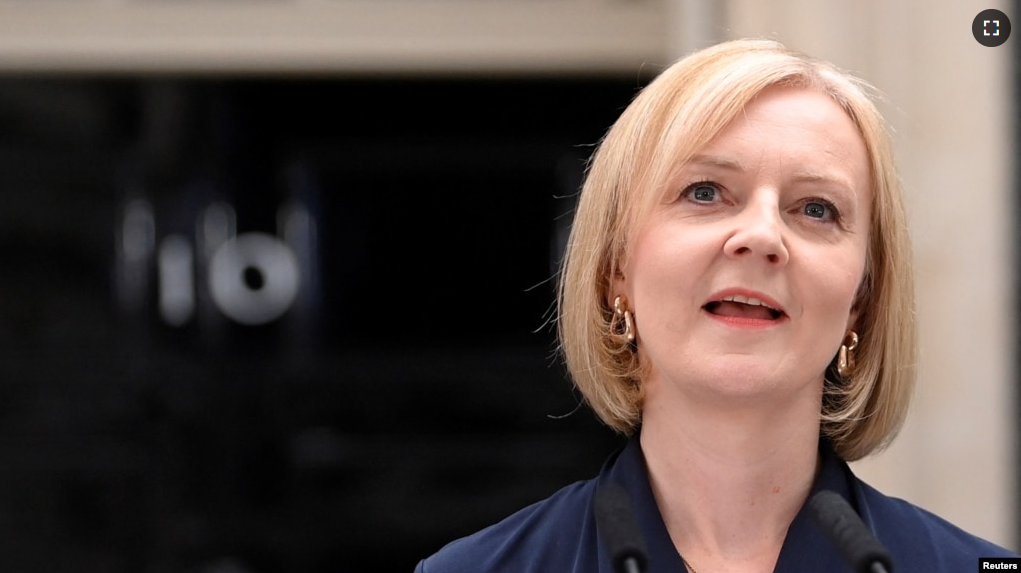Britain’s Prime Minister Liz Truss is promising new policies to deal with the country’s economic problems. Here is what she had to say:
“I will deliver a bold plan to cut taxes and grow our economy. I will deliver on the energy crisis, dealing with people’s energy’s bills, but also dealing with the long-term issues we have on energy supply. And I will deliver on the national health service.”
Truss replaced Boris Johnson as the head of the Conservative Party after winning the party’s leadership vote. Johnson agreed to step down earlier this year.
Truss officially took the position on Tuesday in a ceremony in Scotland with Queen Elizabeth II of England.
Truss becomes Britain’s third female Prime Minister, after Margaret Thatcher and Theresa May.
Truss became Prime Minister because her Conservative Party still holds the majority in Britain’s Parliament. As the party’s new leader, she takes over as prime minister without a general election.
In her comments, Truss discussed a big concern of Britons: rising food and energy prices.
The cost of fuel has gone up sharply in Great Britain over the last two years for two main reasons. First, there has been higher demand for energy as businesses around the world started up again in 2021 after shutting down for much of 2020 for the COVID-19 pandemic. Then, prices rose again in early 2022 when Russia invaded Ukraine, which reduced the supply of gas and oil coming from Russia. Many nations decided to restrict their business with Russia when the war started. That drove prices up.
Truss is Britain’s fourth prime minister in six years. She said she will make a plan to deal with Britain’s economic problems but continue to support Ukraine in its war with Russia. She said one of her first phone calls in her new job will be with Ukrainian leader Volodymyr Zelenskyy.
Truss is expected to use government money to help Britons who cannot pay their energy bills. The plan is expected to come out Thursday and cost taxpayers over $116 billion.
One British citizen discussed the new Prime Minister with the Associated Press outside the Houses of Parliament in London. Rebecca Macdougal is 55 and works in law enforcement. She called the rising cost of living in Great Britain “really quite bad,” and said Truss is making promises to “help the normal working person.” Macdougal wondered if Truss will be able to “deliver” on her promises.
The Conservative Party will likely be faced with calls for an early election from the opposition if Truss cannot ease some of the nation’s economic concerns.
Ed Davey is a leader of the Liberal Democrats, a small opposition party. Davey said people are “really worried … losing sleep over their energy bills.”
Truss, however, does not have to call an election until late in 2024.
As Johnson left as the government leader this week, he said he plans to re-enter private life “invisibly.” However, political observers do not believe the man who was once London’s mayor and the nation’s prime minister will be able to fully disappear.
Unlike Johnson, who was well-known before taking the top political job in Britain, many people are still learning about Truss, who entered parliament in 2010. She became foreign secretary, one of the British government’s top jobs, just one year ago.
Another British citizen, Robert Conway, discussed Truss with an Associated Press reporter in London. He said she has “a big challenging job ahead of her.” Conway, 71, works in electronics manufacturing. He added “hopefully, she’ll bring … a new team, a new start, but it’s going to be a challenging job.”
I’m Dan Friedell.
Dan Friedell adapted this story for VOA Learning English based on a report by the Associated Press.
________________________________________________________________________
Words in This Story
bold –adj. not afraid of danger or difficult situations
deliver –v. to do what you say you are going to do; to provide something promised
challenge –n. a job or problem that is difficult to do or solve
quite –adj. very; notable
invisibly –adv. in a way that is not seen
